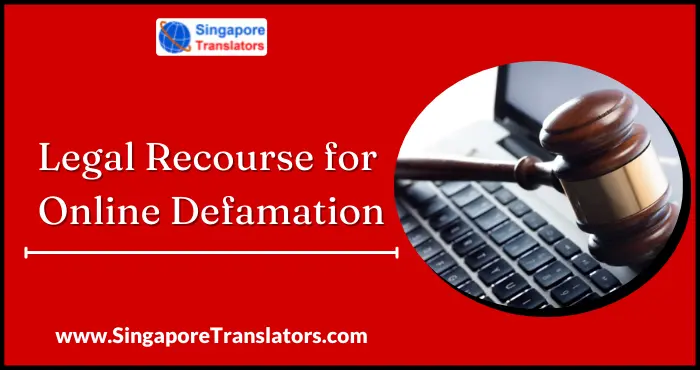Are you the victim of the cruel comments made by online bloggers? Have you been harmed by malicious or untrue allegations made on the internet? Singapore’s laws on online defamation have been introduced especially to protect you people from such type of injustice.

Table of Contents
hide
What is Defamation Law in Singapore?
According to the 499 of the penal code, defamation is considered a criminal offense. The Singapore police have the complete authority to arrest or take legal action against the suspect if sufficient evidence is discovered against them. To prove criminal defamation, it must be shown that the defamer either intended to harm the victim’s reputation with his words or knew there was reason to believe that it would harm it.
Get Fast & Accurate official notarization for ICA, MOM, MFA.
As part of the tort of defamation and the Defamation Act, online defamation is a wrongful activity that might give rise to a civil action. As distinguished from a crime, which is a breach of societal duties owed to society as a whole, a tort is a violation of a civil duty towards a fellow citizen.
As part of the defamation tort, written words can be construed as libel, while spoken words can be construed as slander. Both acts can give victims the rightful authority to take legal action or pursue compensation against perpetrators of either type of defamation.
When Can You Sue for Defamation in Singapore?
When you find that defamatory words against you posted over the interest leading to libel, provided the elements mentioned below are present:
1. The statement in question must be defamatory
Defamatory statements cause harm to victims when they lower their status in society cause they’re shunned or avoided or depict the victim as a target of hatred, contempt, or ridicule.
Suppose, any of the online blogger posts on the internet hinder your identity and describe you as a thief or philanderer, such a post will be considered defamatory since it will directly or indirectly affect your reputation in society.
In addition, a statement can be defamatory even if it suggests defamation rather than expressing it directly.
Therefore, if a blogger implies that you are guilty by stating that you are being investigated by the police, either truthfully or not, you could have a claim against the blogger.
2. Did the statement intend to be humorous or insulting?
Counter-arguments are common in determining whether a statement is defamatory, such as arguing that it was meant more to be humorous than insulting.
Therefore, whether a statement is defamatory depends on its facts and circumstances. The court will determine the statement’s defamatory nature by assessing its seriousness or triviality.
3. The statement in question must refer to the victim
An example of a reference would be a blog post accusing one of dishonesty, mentioning the victim by name, or publishing a photograph of the victim.
The goal here is to determine whether the victim can be identified by the statements in the statement or by the images in the statement.
If a blog post imputes dishonesty to you, a member of that organization, and a reasonable person can relate the accusation to you; a blog post may constitute a reference.
Mistaken identity can arise from inaccurate research or careless language, but these errors do not constitute a defense to defamation.
4. The statement in question must be published or communicated to a third party
For the online publication, there should be a piece of valid evidence to present that the offending statement has already been viewed. For example, if any individual bloggers are trying to make a defamatory statement about you over the internet, the viewing counter can be valid evidence.
However, there are a large number of people who have viewed the statement and considered it immaterial regarding establishing defamation. When one determines the extent of damages, one considers the so-called “audience size. Typically, the size of the audience determines the extent of the damage.
Defenses to a Defamation Lawsuit
In the absence of privilege, the following defenses can be raised against defamation:
- Justification
- Fair comment
Defence of justification
When a maker is defending justification, they need to show that what they said is true both in substance and in fact, meaning that they must substantiate it with facts.
Defense of fair comment
When it comes to the defense of fair comment, the people who outlined the statement need to prove that the statement has the following things:
- An expression of an opinion;
- Based on true facts
- An unbiased opinion; and
- Concerning a matter of public interest.
Remedies in a Defamation Lawsuit
Monetary damages
Defamation lawsuits can result in monetary penalties and/or injunctions against the plaintiff if the court finds the statement false.
It is intended to alleviate the plaintiff’s suffering and restore their damaged reputation by awarding monetary damages. As the court determines damages, it will consider several factors, including:
- The gravity of the statement
- The effect of the statement
- The extent of the publication
Injunctions
There are 2 types of injunctions:
Prohibitory
Interlocutory
Prohibitory
The primary goal of a prohibitory injunction is to stop the publication of further defamatory statements, whereas an interlocutory injunction is to force a retraction of the statement.
Protection from Harassment Act
However, when a false statement is posted about the person over the internet, they may request the district court for protection as per section 15 of the Protection from Placement Act, resulting in the offending statement getting restricted from any further publication.
Can Network Service Providers be liable for defamation?
According to section 26 of the Electronic Transaction Act, the Network Service Providers (NSPs) will not be held responsible for making, publishing, or disseminating. Since the NSPs were simply offering access to such statements.
Steps to Take
If you are the victim of defamation, your primary step should be filing a police complaint against the maker of the statement, only if you have sufficient evidence to present to the police authority regarding the suspicious activity performed by the maker of the statement to hinder your reputation in society. The wrongful activity is done to harm the reputation.
Alternatively, you also have the option to proceed with taking legal actions for the online defamation or file the application as per the Protection from harassment act. If necessary, you may also seek a private settlement outside of court, such as through mediation or arbitration. If in doubt, consult a lawyer.
Conclusion
The article involves all the details concerning online defamation in Singapore. It’s great news for all Singaporeans who were victims of online defamation. Also, it reduces the cases of online defamation. Read each point and terms given above to take legal action and protect yourself from such offense.
When it comes to legal document submission in Singapore, you will require certified translation services in Singapore. Singapore translators offer you the best high court transcription service in Singapore.

